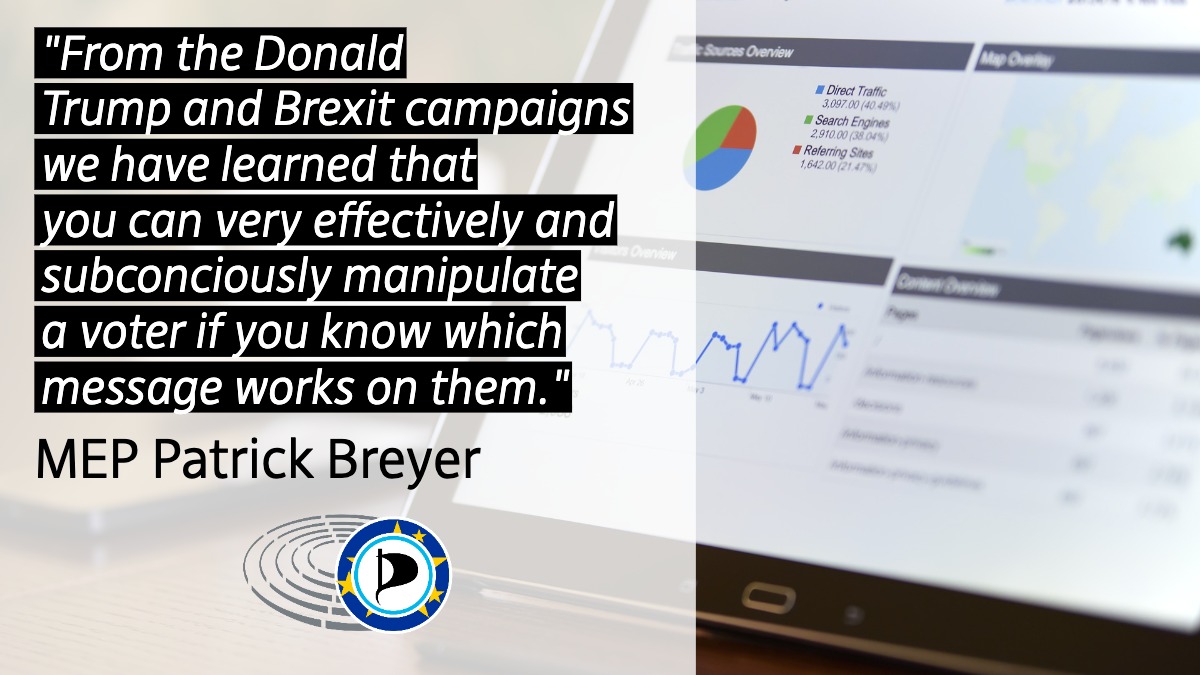Today, the European Parliament’s Committee on the Internal Market and Consumer Protection (IMCO) adopted amendments to draft legislation which seek to restrict the use of personal data to target online political advertisements. Only personal data explicitly provided for this purpose by citizens with their consent would be allowed to use for targeting, excluding the use of behavioral and inferred intelligence on citizens private life. IMCO thus follows the position of the LIBE Committee, which has the lead regarding the proposed regulation of targeting.
Specifically, the Committee thereby endorsed:
- The use of personal data to target online political advertisements would be limited to data explicitly provided for this purpose by citizens with their consent, excluding the use of behavioral and inferred intelligence on citizens (“surveillance advertising”). Refusing consent should be no more complicated than giving it. The “do not track” setting would need to be respected without bothersome prompts. Users who refuse to consent would still have access to online platforms.
- The platforms would be banned from running opaque ad delivery algorithms to determine who should see a political ad; they would only be able to select recipients randomly in the pool of people delineated by the targeting parameters chosen by the sponsor.
- In the 60 days prior to an election or referendum, different political messages may be spread only of the basis of a voter’s language and the constituency they live in, avoiding a fragmentation of the public debate and the sending of contradictory and dishonest messages.
- If a data protection authority such as the Irish DPA fails to enforce the rules against large online platforms, the European Data Protection Board would be able to take over. In cases of illegal political ads targeting it will not only be able to impose financial sanctions but can also temporarily suspend the targeting of ads by advertisers who seriously and systematically violated the rules. This ensures that more affluent sponsors are not able to factor-in the price of financial sanctions in their budget.
- The targeting of political ads on the basis of a person’s racial or ethnic origin, political opinions, religious beliefs, health conditions or sexual orientation is to be banned both offline and online.
- Depending on interpretation, however, it may be that no restrictions apply to the use of personal data (including behavioural and inferred intelligence as well as sensitive data) by campaigns to target political messages via letter, e-mail, or text messaging at large scale. Unfortunately, the targeting rules (Articles 12- and 12) would apply only where external “political advertising services” are used, thus excluding letters, e-mail and text messages sent directly by political parties, for instance, which opens up a loophole. This should be closed.
- Organic, self-posted content is excluded from the proposed targeting rules. Namely they do not cover the amplification of organic content.
Pirate Party MEP Marcel Kolaja, Quaestor and Member of the IMCO Committee, comments:
“Transparency is crucial. It has to be easily verifiable which politicians or political subjects are behind a given political advertisement. Therefore, the proposal presents obligations to disclose the information about the contracting authority, how much money was spent on the ad, if the ad was targeted on the basis of personal data, or for example, why it is targeted on certain groups etc. All of this must be easily verifiable. Each political ad must be in a repository, so citizens, NGOs and journalists can freely verify who paid for the ad.”
Pirate Party MEP Patrick Breyer, co-negotiator in the LIBE Committee, comments:
“The European Parliament is fighting for a ban on using surveillance advertising to manipulate our democratic elections and votes. From the Donald Trump and Brexit campaigns we have learned that you can very effectively and subconciously manipulate a voter if you know which message works on them. While many parties are using personalised targeting, it benefits mostly populist and anti-democratic forces.
“The targeting rules recently proposed by governments in the Council are a mere smoke-screen and will allow the digital manipulation of elections and referendums to continue unabated. Anti-democratic radical forces would continue to use surveillance ads to personally target hate messages and lies to voters who are susceptible to it. This puts the foundation of our democracy at risk. We are witnessing today a toxic mixture of the short-sighted self-interest of the powerful in using surveillance advertising themselves and the business interests of big tech.
“The European Parliament will need to be firm in the trilogue negotiations with Council to protect our democratic elections and votes.”
In February the European Parliament as a whole will adopt the position, after which it will enter into negotiations with Council.
Press contacts:
Nikolaus Riss (EN/DE)
nikolaus.riss@europarl.europa.eu
+43 6769694000 // +32 472593129
Tomáš Polák (EN/CZ)
tomas.polak@europarl.europa.eu
+42 0728035059


0 comments on “EU lawmakers want to stop surveillance-based political advertising”